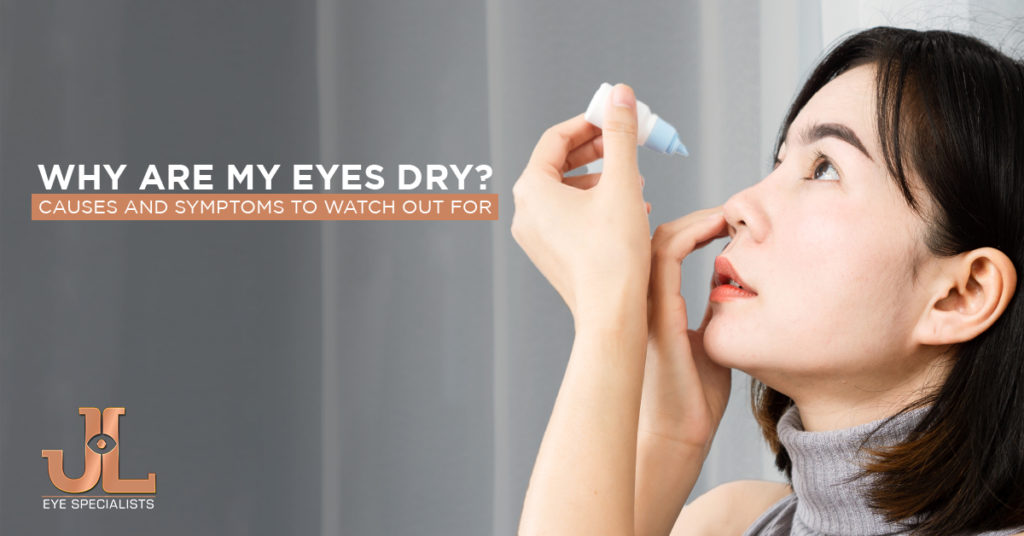Why Are My Eyes Dry? Causes And Symptoms To Watch Out For

Our eyes are the gateway to our emotions. They help communicate how we are feeling and one way is through our tears. Tears are essential to help us see clearly and maintain the health of the eyes. The main function of the tears is to keep the eyes moist and lubricated. The tear film is essential for clear vision and maintaining a healthy eye surface.
What happens if we lack tears? Dry eyes occur when the eyes produce too little or insufficient tears. The condition may affect one or both eyes. There are various dry eye causes and we’ve rounded up everything you need to know about the condition. But first, let’s tackle the basics.
Book a consultation with Dr Jimmy Lim today.
What are the Functions of Tears?
The three main parts of the tear system include the glands that create tears, the ducts inside the nose that tears drain through, and the openings where the tears flow out of the eye.
Basal tears are found in the eyes all the time as a constant shield between the eye and the external environment. It keeps dirt and foreign objects away. Meanwhile, reflex tears are created in the eyes when there’s a need to wash away harmful irritants such as onion fumes, foreign bodies, and smoke. Lastly, emotional tears are made in response to emotions like sadness, fear, and joy.
Every time we blink, the tears spread across the eye and stay there for a while. This is termed tear stability, which is crucial to help keep the eye moist. Apart from lubricating the eyes, tears also aid the immune system and remove irritants.
The tears also help prevent dryness by coating the eye’s surface and protecting it from external irritants. Also, tears prevent infection as they wash our foreign bodies that enter the eye. Tears also contain lysozyme, a substance that has antibacterial properties. Further, tears work by supplying nutrients and oxygen to the eyes, creating a smooth surface of the eye to prevent bumps and scratches, and heal wounds or damage on the eye’s surface.
The tear duct is part of the tear drainage system that drains tears via the nasal bone and into the back of the nose. Also known as nasolacrimal ducts, they are open to the eye surface at the corner of the upper and lower lids of each eye. Normally, the tears flow from the lacrimal glands over the eye’s surface and into these openings to be drained through the nasolacrimal ducts.
Dry Eye Syndrome
A dry eye is a condition where a person doesn’t have enough tears to moisten, lubricate, and nourish the eye. This can make you feel uncomfortable and can affect your vision if it’s not managed immediately. Having dry eyes is common, especially among older adults. It’s important to spot the condition right away and manage it appropriately.
Meanwhile, in the long-term, the condition is called dry eye syndrome, wherein the eyes don’t produce adequate tears or they do not maintain a normal tear layer to cover the eyes. When this occurs, your eyes may be prone to infections and the surface may become inflamed, leading to eye discomfort, poor vision, and in very severe cases, corneal scarring.
Learn More About: Dry Eyes – Causes, Symptoms & Treatment
Dry Eye Causes
We should address this big question – why are my eyes dry? There are a multitude of factors that can cause dry eyes. Here are some dry eye causes.
Ageing. The first major cause of dry eyes is ageing. When we grow older, basal tear production slows down, causing dry eyes. Also, women undergoing hormonal changes during menopause may experience dry eyes.
Medication. Certain medicines, such as decongestants, antihistamines, antidepressants, and blood pressure medications can reduce tear production. Other medicines that may induce dry eyes include heartburn medicines, sleeping pills, and diuretics.
Medical conditions. People with medical conditions like rheumatoid arthritis, Sjögren’s syndrome, collagen vascular diseases, lupus, and thyroid disease may cause dry eyes. Blepharitis or the inflammation of the eye surface can also cause dry eyes.
Vitamin A deficiency. A deficiency in vitamin A can cause dry eyes. It can also lead to a condition called xerophthalmia, which causes dry eyes. It can progress to having spots on the eyes and night blindness, and eventually damage the cornea.
Tear gland damage. Damage to the tear glands can cause dry eyes. In some instances, external triggers or medical treatments.. However, the damage is temporary and goes away when the gland has healed.
Dry Eye Symptoms
People with dry eyes may experience irritated eyes as if something is inside. The common signs and symptoms of dry eyes include:
- Burning or stinging sensation
- Blurred vision, especially when reading
- Itching
- Redness
- Light sensitivity
- Scratchy or gritty feeling
Who Are At Risk
Anyone can develop dry eyes, but some people are at a higher risk. They include:
- People who are more than 50 years old
- Women
- People with autoimmune diseases like Sjögren syndrome or lupus
- Those who wear contact lenses
- Prolonged screen time
- Long term contact lens use
- People with a deficiency in Vitamin A or omega-3 fatty acids
What To Watch Out For
We’ve experienced having dry eyes, but prolonged symptoms can cause complications that impair your vision. Consider having your eyes checked if your symptoms do not improve.
Also, contact your ophthalmologist if you have prolonged and excessive dry eyes. Here are the signs you should watch out for.
- Vision loss or visual disturbances
- Eye discomfort
- Severe pain or irritation
- Severe itching
If the condition is left untreated, you’re at risk of developing complications that can lead to eye damage. These include infections, corneal abrasion and damage, and corneal ulcers.
How Is Dry Eye Syndrome Treated
The treatment for dry eyes depends on the underlying cause. The doctor will determine what’s causing the condition and treat it from there. However, there are steps you can take to ease the symptoms of dry eyes.
These include:
-
Over-the-counter eye drops
For mild and occasional dry eyes, you can use artificial tears (dry eye drops) to help lubricate the eyes.
-
Prescription drugs
While using artificial tears is the first go-to treatment for dry eye, more severe symptoms may require a prescription from your ophthalmologist. Some of these drugs help improve dry eye symptoms, such as immune-modulating drugs, corticosteroids, cyclosporin and tear-stimulating drugs.
-
Lifestyle changes
If the underlying cause of dry eyes is in the environment, the doctor may suggest lifestyle changes to protect the eyes. These include avoiding smoke, air conditioning, and wind, using a humidifier, wearing wrap-around sunglasses when outdoors, getting enough sleep, limiting screen time, and drinking up to 8 glasses of water every day.
Plus, do not blow air in the eyes, blink more often or take an eye break, and use a warm compress to help restore moisture and lubrication in the eyes.
In a nutshell…
Having dry eyes can be a great discomfort since, aside from vision problems, you can experience irritation and a burning sensation. The tears play important functions, including providing lubrication in the eyes, preventing infections, and communicating our emotions.
Anyone can be at risk, hence, it’s crucial to prevent dry eyes and avoid activities that can cause the condition. Furthermore, always having your eyes checked by visiting your doctor regularly can help diagnose the condition and determine the causes.
When was the last time you scheduled an eye exam? Book an appointment today with Dr. Jimmy Lim at JL Eye Specialists. We customise the care of your eyes based on your needs, from the initial consultation to after-care treatment.
Related Posts:
Relevant Services:
Relevant Services:
Our Doctor

DR. JIMMY LIM
Gleneagles Medical Centre
6 Napier Road #07-10,
Singapore 258499
Phone: +65 6258 8966
Fax: +65 6258 8766


